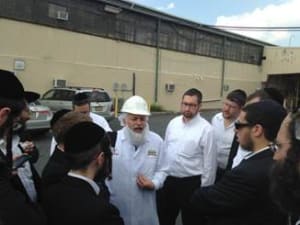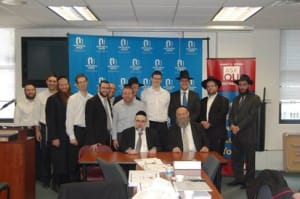
70 participants from ASK OU 12 at the OU’s New York City headquarters. Seated foreground from left: Senior Educational Rabbinic Coordinator Rabbi Yosef Grossman; OU Executive Vice President Allen Fagin; and OU Kosher CEO Rabbi Menachem Genack.
There is an annual cycle in Judaism in which season follows season, holiday follows holiday, observances follow observances, and of course, Shabbos follows Shabbos.
At the headquarters of OU Kosher in New York, there is a semi-annual cycle, that is, every two years, in which rabbis, advanced students, mashgichim and others interested in learning practical applications of the centuries-old laws of kashrus, gather for a three-week internship or one-week training program taught by the experts who make Orthodox Union kosher certification the world’s largest and most respected hashgacha.
The program is called ASK OU (Advanced Seminars in Kashrus) and this year was the 12th session, going back to 1986. There were 70 students, the largest group ever, many of whom came from long distances to participate; 25 took the three-week program (which included the one-week session) and the remainder the one-week version.
Funding for ASK OU 12 and other OU kashrus education programs is provided by the Harry H. Beren Foundation of New Jersey.
As always, the program was organized and coordinated by Rabbi Yosef Grossman, Senior Educational Rabbinic Coordinator of OU Kosher. He assembled an all-star roster of OU rabbis and guest lecturers who addressed what turned out to be a most impressive group of students.
“The feedback from the lecturers is that this has been the best group we’ve ever had,” Rabbi Grossman said with pride. “They were very knowledgeable in the halachos of kosher law; a number of them had experience in hashgacha (certification); they were bright; the questions they asked were high caliber and on target. Both in terms of quantity and quality, this was perhaps our most impressive class.” Some of the students are sons of current rabbis on the staff of OU Kosher; six OU Kosher rabbis are themselves alumni of the program.
As expected, many of the participants in ASK OU 12 came from neighborhoods of intense Jewish observance in close proximity to the OU – Borough Park, Flatbush and Williamsburg in Brooklyn; Lakewood and Englewood in New Jersey; Monsey/Spring Valley and Suffern in Rockland County, to the north of New York City; the Five Towns on Long Island; Kew Gardens Hills and Far Rockaway in Queens.
A substantial group of others, however, needed planes, not cars or the subway, to get to OU headquarters. They represented Minneapolis, Pittsburgh, Chicago, Silver Spring (MD), Portland (OR), Fresno and Vallejo (CA), Cleveland, Philadelphia and even Mexico City.

Rabbi Moshe Perlmutter conducting a tour of Oasis Foods Company in Hillside, NJ.
This year’s student body brings the number of ASK OU alumni to more than 800, many of whom are working in the kosher certification industry.
Participants experienced lectures, PowerPoint presentations, as well as trips to OU certified restaurants, food service establishments, and plants. They received intensive instruction on how to do a restaurant audit – a necessity for any mashgiach working in an OU-certified establishment. The subjects covered in the sessions stretched from soup to nuts – actually a wide variety of foods, all of which present their own complications and situations for the mashgiach to deal with.
These foods included fish; cheese and whey; tea; cake; eggs; fermented products; grape juice, wine and liquor; wine vinegar; and bread/challah/ baking. The students explored Passover certification; enzymes; food service protocols in banquet halls, synagogue kiddushes and hotels; learned how liquids such as oils are transported in kosher tank trucks; discussed how Jewish kosher law applies to non-Jewish companies; learned how to kasher a plant and its machinery; were introduced to the challenges of OU certification in India, Turkey and Egypt; and learned from OU Kosher’s legal and rabbinic experts how the Orthodox Union protects its symbol against unauthorized use. Also discussed were how to set up a local va’ad hakashrus and how to draw up a kosher contract.
As may be expected, the students were vastly impressed with the program. One told Rabbi Grossman in great confidence that the internship program “was the most intensive, educational three weeks of my life (including yeshiva – shh!). Others described the program using such words as “thorough; insightful; very well organized and very professional; an amazing eye opener; excellent and informative; very professionally run; punctual; very informative and educational with very interesting topics; amazing; wonderful; very informative; and excellent in all presentations.”

Seated foreground from left: Rabbi Moshe Elefant, OU Kosher Executive Rabbinic Coordinator; and Rabbi Yosef Grossman. Standing from left: Rabbi Zev Meisels, Cleveland; Rabbi Yisroel Meir Ebstein, Minneapolis; Rabbi Ahron Yoel Kushner, Cleveland; Rabbi Chaim Leibowitz, Pittsburgh; Rabbi Dov Chastain, Portland, OR; Rabbi Avrahom Weisswasser, Pittsburgh; Rabbi Shlomo Garfinkel, Philadelphia; Rabbi Menachem Mendel Zirkind, Fresno, CA; Rabbi Yisroel Kleinman, Silver Spring, MD; Rabbi Abraham Mario Steinberg Dantus, Mexico City; Rabbi Nachum Rosenberg, San Diego; Rabbi Elchonon Tenenbaum, Vallejo, CA
(OU Executive Vice President Allen I. Fagin wrote to Rabbi Grossman after seeing these descriptions of the program, “What outstanding comments! Yasher koach and thank you!”)
Those who had to come from a distance obviously believed that the trip was worth the effort. Menacham Mendel Zirkind of Fresno, CA, who attended the three-week program, is the son of OU rabbinic field representative Rabbi Levy Zirkind and travels with his father on breaks from yeshiva. “I came here to further my knowledge of the practical hashgacha world. I think very highly of the ASK OU program and have and will continue to promote this program.”
Kollel scholar Avrohom Weisswasser from Pittsburgh, attended the one-week program. “I found the ASK OU program extremely informative. The best parts were the hands-on presentations with meat and vegetables as well as the dairy. I joined with the hope to better understand how contemporary kashrus is done and the OU well exceeded my expectations.”
Rabbi Dov Chastain is rabbinic administrator of Oregon Kosher, in Portland. “As a rabbinic administrator in an “out-of-town” va’ad hakashrus, it is very valuable to me to be able to come in and learn from the expertise of the OU. As the largest kosher certification agency in the world, its resources and skills provided much valuable information.”
Nachum Rosenberg, a teacher in San Diego, attended the three-week program. I came here to learn more about the kosher industry to help educate my local community. The highlight so far has been the hands-on presentations, whether they be about checking vegetables for insects; meats with forbidden fats; chickens with injuries; or examining a fish to see if it’s kosher.”
Chaim Lebowitz, a kollel fellow in Pittsburgh, attended the three-week internship. “The entire program shed a new light into the kashrus world, especially behind the scenes. The hands-on experience with bugs and visiting plants brought the concepts learned to a practical level.”
Rabbi Elchonon Tenenbaum, campus rabbi at Touro University in Vallejo, CA, took part in the one-week program. “I took the course to enhance my understanding of contemporary and practical kashrus. To be able to see first-hand the intricacies and details of kashrus has brought my appreciation to a new level. The services provided by the OU are invaluable to yiddishkeit in the 21st century.”
Abraham M. Steinberg is a rabbinic field representative for Mexico’s Hashgacha. “I took the course because I want to have an international point of view and the OU is the most international representative of kashrus. I want to have more experience of what I am dealing with every day at my work because many (Mexican) companies want higher standards to be able to sell to the United States.”
Shlomo Garfinkel, a mashgiach in Philadelphia, attended the one-week session and summed it up as follows: “The whole program was excellent. Kol hakavod.”
Through the entire three-week and one-week sessions, participants were aware that the OU’s expertise and the quality of its staff make its kashrus training seminar the leader in the field. As one student declared, “Only a great organization like the OU can possibly put through such a tremendous program. It must take great effort but the zechus (merit) is bigger.”
Or, as another added, “Only an organization like the OU could give such a course.”
By Stephen Steiner

